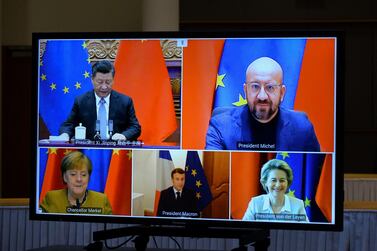It must have seemed like a no-brain decision to deploy mass data processing techniques to deliver a result for Britain’s school leavers in the country’s national exams.
Educational reformist could only dream of a fell-swoop moment that would pitch the process into the 21st century. The school shutdown earlier this year, for a time, seemed to provide an unexpected opportunity. Instead the outcome was messy and there was a revolt from those subjected to a change they did not understand.
The fallout shows that the interplay between humans and digital innovation is one of the great puzzles of the Covid-19 pandemic.

The British government announced last Wednesday that for a second year running it would cancel the A-level and GCSE exams process. The decision was inevitable but it also marked the demise of an experiment.
Officials had tried to replace testing with an algorithmic allocation of marks when the issue first arose in the spring. Now, in the third pandemic lockdown, the simple reality is that approach was unacceptable to all those with a stake in the exams outcomes.
The issue affects thousands of students in the UAE and a number of Middle Eastern countries, where A-levels and GCSEs are widely used, blue-riband exams.
Why the algorithm method became unacceptable goes to the heart of a wider discovery about digital tools during the lockdowns. Constrained by circumstances, people have been better able to recognise the loss of autonomy to machines. They can draw a line against it going too far.
The A-level results episode was a salutary lesson. Students didn’t understand why they had been assessed at a particular grade. Unable to see the rationale at work, they did not want to give over their destiny to an opaque system. This framework was not one that could be easily be influenced, and there was no certainty of a just outcome.
There is no certainty the alternative system will work either. Teachers operating an assessment of their pupils themselves is bound to mean subjective application of the marking system.
This, however, has a flesh and blood manifestation. Students can relate to it. Some societies have trialled digital social credit mechanisms to provide incentives and disincentives while using digital services.
Commercial developers use algorithms to market and tailor product ranges. It is one thing to have minute-to-minute purchases determined by the system. An entirely different vista opens up if lifelong, gateway decisions are entrusted to automated systems.
The uprising against the mathematical application cannot be surprising, given what’s at stake. By confining people to their homes, the pandemic has allowed for a reassessment of the role of technology. To communicate, people use devices. To shop, they use algorithmic platforms. To be entertained, they are almost exclusively reliant on the virtual.
Most acceptable to consumers are platforms that involve an exchange of convenience for data. Augmented intelligence that helps direct healthcare or improves educational access is another welcome development. It’s the out-and-out replacement of human beings that was rejected in the A-level debacle and increasingly elsewhere.

Social media platforms face a similar backlash. Pressure for more controls on how the sites are used is bound to escalate after the events of the week in Washington.
One telling statistic is that almost two thirds of people who belong to extremist Facebook groups in the US were directed to join by the site’s suggestion. Directing people into extremist circles is actively posing a risk for society beyond anything a commercial enterprise should entertain.
Again, the focus shifts to the risks posed by technological advancement to the wider population. Mass impact is the factor that technology cannot wish away. Politics done face to face has, in recent decades, tended towards moderation.
Investigations into how the unfortunate woman who was shot and killed in the US Capitol was radicalised show a pathway of escalation on messaging platforms. Ashli Babbitt was not a victim of a moment, but almost a decade of exposure to intense political escalation had its effect.
After so many months of pandemic confinement, what is remarkable is that most people have not become more susceptible to conspiracy theories and remain passive consumers of whatever the algorithm doles out.
The strong uptake of vaccine programmes offered by governments in places such as the UAE and UK shows people can prioritise themselves and override the virtual disinformation that is often described as bombarding ordinary individuals.
There seems to be a heightened awareness of personal vulnerabilities. Taking this forward becomes an act of mental fortitude.
Perhaps it is understandable that a pathogen that can so easily infect our systems dictates much of our lives. Thus we reassess all kinds of easy interactions at the virtual level and during interactions with automated systems. The skill of differentiation has come to the fore. As a one-off, a driverless car is rational, but as a collective activity it could easily fail to gain cross-community confidence.
The four walls that surround those who isolate are also mental markers that can be externalised. That tilts the balance in favour of how much faith the systems and algorithms can generate among the people.
Damien McElroy is London bureau chief at The National






